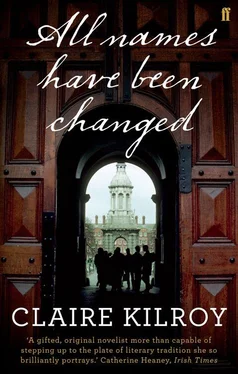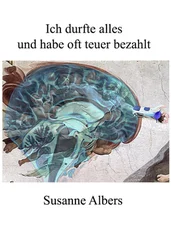Claire Kilroy - All Names Have Been Changed
Здесь есть возможность читать онлайн «Claire Kilroy - All Names Have Been Changed» весь текст электронной книги совершенно бесплатно (целиком полную версию без сокращений). В некоторых случаях можно слушать аудио, скачать через торрент в формате fb2 и присутствует краткое содержание. Год выпуска: 2010, Издательство: Faber & Faber, Жанр: Современная проза, на английском языке. Описание произведения, (предисловие) а так же отзывы посетителей доступны на портале библиотеки ЛибКат.
- Название:All Names Have Been Changed
- Автор:
- Издательство:Faber & Faber
- Жанр:
- Год:2010
- ISBN:нет данных
- Рейтинг книги:5 / 5. Голосов: 1
-
Избранное:Добавить в избранное
- Отзывы:
-
Ваша оценка:
- 100
- 1
- 2
- 3
- 4
- 5
All Names Have Been Changed: краткое содержание, описание и аннотация
Предлагаем к чтению аннотацию, описание, краткое содержание или предисловие (зависит от того, что написал сам автор книги «All Names Have Been Changed»). Если вы не нашли необходимую информацию о книге — напишите в комментариях, мы постараемся отыскать её.
All Names Have Been Changed — читать онлайн бесплатно полную книгу (весь текст) целиком
Ниже представлен текст книги, разбитый по страницам. Система сохранения места последней прочитанной страницы, позволяет с удобством читать онлайн бесплатно книгу «All Names Have Been Changed», без необходимости каждый раз заново искать на чём Вы остановились. Поставьте закладку, и сможете в любой момент перейти на страницу, на которой закончили чтение.
Интервал:
Закладка:
When she had finished speaking, she briskly and tightly embraced me, her brooch jabbing my chest. Then she released me and walked away, click-clack, down the wooden stairs in her high heels. She left the building, and I watched from the window until she disappeared through the passageway between the 1937 Reading Room and the Colonnades. She did not look back. I never saw Antonia again. I never saw Aisling again. I never saw Faye again. I sat down at the workshop desk in my old chair and remained in House Eight for the rest of the afternoon and much of the evening, thinking, thinking, furiously thinking, until it was almost dark.
There is so much that I have left out.
*
It was mid-May before I got around to saying goodbye to Glynn. I came upon him in a reflective mood.
It was one of those days that fills you with aching nostalgia for the summer that has not yet been. Such days in the past would have found me paralysed with regret. Regret for what, exactly, it is difficult to put into words. Regret for all the things that should have been happening in my life, but never would. I felt no regret that day as I walked through the broad leafy squares of Trinity. The lawns were scattered with bare-armed girls lost in books. I was new to the sense of completion which engulfed me that afternoon, new to the awareness that a distinct period in my life had come to a close, an era so discrete that already I could see it as a finite entity, a car wreckage some yards back on the road behind me, from which I had escaped unscathed. This knowledge had been hard enough won all the same.
Glynn was in his office in the English Department. It smelled of books and sun-warmed carpet tiles.
‘It’s yourself,’ he said when he opened the door. ‘Come in, come in, sit down.’ He lifted a stack of books from the spare seat to make way for me. The black eye Aisling mentioned had faded without trace, as if that whole hellish night had been a figment of our imagination.
Glynn made a point of shutting his red notebook and removing it from my reach. He stationed his fountain pen on top of it like a sentry, though I had not the slightest interest in trying to steal a glimpse at whatever was written there. Those days were over. He raised his glasses and peered at me across the desk. ‘Your hand is out of the plaster, I see.’
I held it up and flexed my fingers. ‘It is. Good as new.’
‘The walls had better watch out!’ The amusement Glynn derived from this witticism revealed the gap where his front tooth had once been. We contemplated each other’s battle wounds for a moment.
‘So anyway,’ I said, ‘I’m moving to Paris.’
‘Go ‘way. When?’
‘Tonight.’ My rucksack was propped against the wall outside his door.
Glynn raised his eyebrows at this information and nodded thoughtfully for a long old time. It was good to speak to him like that, finally. Like adults, with restraint and without rancour, as if we were talking about people we had once known. Which, I suppose, we were.
‘Tell us: are you still writing about that Flynn fecker?’
‘I am and I amn’t.’
‘Arra.’ He tossed his head ruefully.
I forget most else of what passed between us as my head was suddenly crowded with fresh thoughts, thoughts which had nothing to do with Glynn but were instead a realisation of what it signified to inhabit the world as a man, to possess a past and a small degree of certainty. All new to me at the time, as I say, and a little previous as it turned out, but there it is, there you have it. One thing I clearly recall is Glynn’s announcement of his decision to quit teaching. He issued this statement then coyly examined my face for a reaction. I did not react. What did he want? What did he expect me to say, after everything?
He averted his face. ‘I’ve lost them,’ he suddenly admitted.
‘Who?’
‘My fairies.’
‘Your fairies?’
‘The women. The four girls. I’ve lost them.’
I paused. ‘Yes, I’m afraid you have lost them.’ There was no point in lying to the man any more.
‘They were so beautiful.’
‘They were.’
‘They are still in the world, I suppose.’
‘I suppose they are.’
‘Abroad in the world.’ He liked that idea. His hand described a curlicue in the air, ever the maestro.
‘Yes.’
‘But no longer in my world.’
‘At least you had them, Professor Glynn.’
‘There is that.’
‘And you’ll see them from time to time, here and there, in unexpected places.’
‘I dearly hope so.’
I didn’t tell him that he had driven his fairies away, that he had nobody to blame for the early and terminal disbandment of the group but himself. I didn’t need to tell him. Glynn knew. He was, after all, an artist of personal tragedy, not the noble, stoical kind but the self-inflicted variety. It was why the six of us understood each other so well.
I left him there, racked with remorse, shuddering in pain, already searching for the words to describe it, already groping for metaphors. He had lost the women and recovered his great subject — longing. They were his fairies, alright. Glynn was precisely where he wanted to be, in a paroxysm of torment approaching the condition of ecstasy. Suffering, whilst training a canny eye on that suffering, the artist’s eye, the eye of the imagination.
‘By the way,’ he asked as I was leaving, ‘what do you think of Conversations with a Blackbird as a title?’
Glynn took pleasure in teasing us this way, right to the bitter end. All year, he had led us on, flashing demure glimpses of his artistic self, a raised hem here, a lowered neckline there, taunting us with the notion that our opinions actually mattered to him.
‘It’s a beautiful title,’ I averred as vehemently as I was able. ‘It is absolutely stunning, Professor.’
I knew he would despise this response — the measure of a work of art’s beauty as the criterion by which it was assessed — but that was the whole point. I wanted Glynn to despise my judgement. I wanted him to feel that he knew more than the likes of me and to thereby regain the authority, the courage, the audacity required to proceed. I indulged him to facilitate the engendering of a mood conducive to composition. Nobody wrote about September like Glynn.
Some writers preferred platitudes to no response at all. I had presumed before I knew him not to count Glynn among their number, which shows how little I understood about the chaos of the writing life, the dreadful tumult that descends upon a man. No instructions, no manuals, no progress reports. Just the wanderings of your own imagination. The chaos had to be calibrated every now and then. It had to be shattered by matters of no importance to remind the artist why he had devoted his life to it in the first place. Once Glynn got his dose of platitudes, he could reject their mundanity and feel confirmed in the choices he had made. All the man needed was to feel he had choices. It wasn’t so much to ask. I hesitated before closing the door — the finality was momentarily unbearable — then I pulled it shut on him, gently, gently, so as not to in any way suggest it was a reproof.
He didn’t go with the blackbird title in the end. Electra Is Complex , his novel charting the doomed affair between a middle-aged professor and his young student, was published two years later. His doomed affair and subsequent redemption. Glynn was a new man in his author’s photograph. No longer meat-faced, liver-lipped, clown-haired, glowering. A big, unguarded smile for the female photographer, revealing a gaggle of mismatched teeth, at least one of which I knew to be fake.
*
Which left Guinevere. Guinevere Wren. The name became her. More so than Electra, but these are matters of taste and artistic difference. Would she be waiting for me at the gate?
Читать дальшеИнтервал:
Закладка:
Похожие книги на «All Names Have Been Changed»
Представляем Вашему вниманию похожие книги на «All Names Have Been Changed» списком для выбора. Мы отобрали схожую по названию и смыслу литературу в надежде предоставить читателям больше вариантов отыскать новые, интересные, ещё непрочитанные произведения.
Обсуждение, отзывы о книге «All Names Have Been Changed» и просто собственные мнения читателей. Оставьте ваши комментарии, напишите, что Вы думаете о произведении, его смысле или главных героях. Укажите что конкретно понравилось, а что нет, и почему Вы так считаете.












